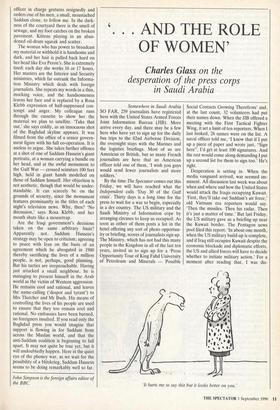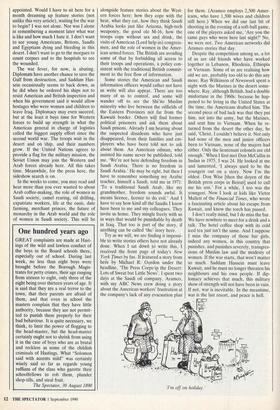. . AND THE ROLE OF WOMEN'
Charles Glass on the
desperation of the press corps in Saudi Arabia
Somewhere in Saudi Arabia SO FAR, 259 journalists have registered here with the United States Armed Forces Joint Information Bureau (JIB). More arrive every day, and there may be a few here who have yet to sign up for the daily bus trips to the 82nd Airborne Division, the overnight stays with the Marines and the logistics briefings. Most of us are American or British, but so many French journalists are here that an American officer told one of them, 'I wish you guys would send fewer journalists and more soldiers.'
By the time The Spectator comes out this Friday, we will have reached what the Independent calls 'Day 30 of the Gulf crisis'. Thirty days is a long time for the press to wait for a war to begin, especially in a dry country. The US military and the Saudi Ministry of Information cope by arranging circuses to keep us occupied. As soon as either of them posts a list in the hotel offering any sort of photo opportun- ity or briefing, scores of journalists sign up. The Ministry, which has not had this many people in the Kingdom in all of the last ten years, invited us to sign up for a 'Press Opportunity Tour of King Fand University of Petroleum and Minerals — Possible Social Contacts Growing Therefrom' and, at the last count, 32 volunteers had put their names down. When the JIB offered a meeting with the First Tactical Fighter Wing, it set a limit of ten reporters. When I last looked, 26 names were on the list. A naval officer told me, 'I know that if I put up a piece of paper and wrote just, "Sign here", I'd get at least 100 signatures. And the rest would come along demanding I put up a second list for them to sign too.' He's right.
Desperation is setting in. When the media vanguard arrived, war seemed im- minent. All discussion last week was about when and where and how the United States would attack the Iraqis occupying Kuwait. 'First, they'll take out Saddam's air force,' old Vietnam era reporters would say. 'Then the missiles. Then his radar. Then it's just a matter of time.' But last Friday, the US military gave us a briefing up near the Kuwait border. The Pentagon news pool filed this report: 'In about one month, when the US military build-up is complete, and if Iraq still occupies Kuwait despite the economic blockade and diplomatic efforts, the US and allied forces will have to decide whether to initiate military action.' For a moment after reading that, I was dis- 'It hurts me to say this but it looks better on you.' appointed. Would I have to sit here for a month dreaming up feature stories (not unlike this very article), waiting for the war to begin? I was not alone. Nor was I alone in remembering a moment later what war is like and how much I hate it. I don't want to see young Americans, Britons, Saudis and Egyptians dying and bleeding in this desert. I don't want to go to the morgues to count corpses and to the hospitals to see the wounded.
The war fever, for now, is abating. Diplomats have another chance to save the Gulf from destruction, and Saddam Hus- sein occasionally seems to back down, as he did when he ordered his ships not to resist American and British inspection and when his government said it would allow hostages who were women and children to leave Iraq. Diplomacy may even succeed, but at the least it buys time for Western forces to build up strength in what the American general in charge of logistics called the biggest supply effort since the second world war. The troops wait in the desert and on and their numbers grow. If the United Nations agrees to provide a flag for the military mission, the Soviet Union may join the Western and Arab forces already here. All this takes time. Meanwhile, for the press here, the sideshow search is on.
In the weeks to come, you may read and hear more than you ever wanted to about Arab coffee-making, the role of women in Saudi society, camel rearing, oil drilling, expatriate workers, life at the oasis, date farming, merchant princes, the future of monarchy in the Arab world and the role of women in Saudi society. This will be alongside feature stories about the West- ern forces here: how they cope with the heat, what they eat, how they think Saudi Arabia looks just like Arizona, high-tech weaponry, the good ole M-16, how the troops cope without sex and drink, the visits of American (Lord help us) congress- men, and the role of women in the Amer- ican armed forces. The British are avoiding some of that by forbidding all access to their troops and operations, a policy con- sistent with the traditional British commit- ment to the free flow of information.
Some stories the American and Saudi information officers would rather not have us write will also appeg. There are too many of us to control, and some will wander off to see the Shi'ite Muslim minority who live between the oilfields of the Eastern Provinces not far from the Kuwaiti border. Others will find former political prisoners and ask them about Saudi prisons. Already I am hearing about the suspected dissidents who 'have just disappeared, from their families and em- ployers who have been told not to ask about them. An American oilman, who insisted his name never be published, told me, 'We're not here defending freedom in Saudi Arabia. There is no freedom in Saudi Arabia.' He may be right, but then I have to remember something my Arabic teacher, himself a Saudi, told me in 1971: 'To a traditional Saudi Arab, like my grandmother, freedom sounds awful. It means licence, licence to do evil.' And I have to say how kind all the Saudis I know have been to me and my colleagues. They invite us home. They mingle freely with us in ways that would be punishable by death in Iraq. That too is part of the story, if anything can be called 'the' story here.
Try as we will, we are finding it impossi- ble to write stories others have not already done. When I sat clOwfi p:3 write this, I received the front page of today's New York Times by fax. It katured a story from here by Mi6hael R. Gordon under the headline, 'The Press Corpslp the Desert: Lots of Sweat but Little News'. I spent two days at the Saudi oil company, Aramco, with my ABC News crew doing a §tory about the American workers' frustration at the company's lack of any evacuation plan for them. (Aramco employs 2,500 .Amer- icans, who have 1,500 wives and children still here.) When we did our last bit of shooting in the evening of a soft-ball game, one of the players asked me, 'Are you the same guys who were here last night?' No, we were not. Two American networks did Aramco stories that day.
Despite the competition among us, a lot of us are old friends who have worked together in Lebanon, Rhodesia, Ethiopia or Vietnam. Some of us are realising how old we are, probably too old to do this any more. Ray Wilkinson of Newsweek spent a night with the Marines in the desert some- where. Ray, although British, had a double misfortune in the 1960s: because he hap- pened to be living in the United States at the time, the Americans drafted him. The second piece of bad luck was that they put him, not into the army, but the Marines, and sent him to Vietnam. When he re- turned from the desert the other day, he said, 'Christ, I couldn't believe it. Not only had none of the men and junior officers been to Vietnam, none of the majors had either. Only the lieutenant colonels are old enough.' When I first met Don McCullin in Sudan in 1975, I was 24. He looked at me and lamented, 'I always used to be the youngest out on a story. Now I'm the oldest. Don Wise [then the doyen of the British press corps in Beirut] used to call me his son.' For a while, I too was the youngest. Now I look at kids like Victor Mallett of the Financial Times, who wrote a fascinating article about his escape from Kuwait, and know the torch has passed.
I don't really mind, but I do miss the bar. We have nowhere to meet for a drink and a talk. The hotel coffee shop with its cold iced tea just isn't the same. And I suppose I miss the company of those bar girls, indeed any women, in this country that punishes, and punishes severely, transgres- sions of Muslim law and the modesty of women. If the war starts, that won't matter so much. Saddam Hussein must leave Kuwait, and he must no longer threaten his neighbours and his own people. If dip- lomacy achieves that much, this military show of strength will not have been in vain. If not, war is inevitable. In the meantime, war is the last resort, and peace is hell.
'I'm off on holiday.'



















































 Previous page
Previous page